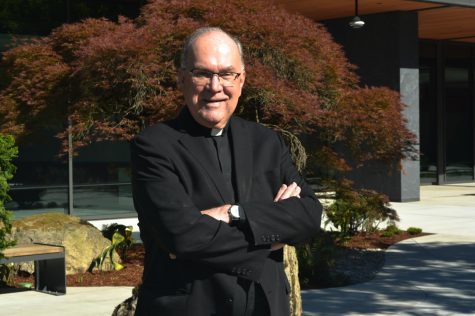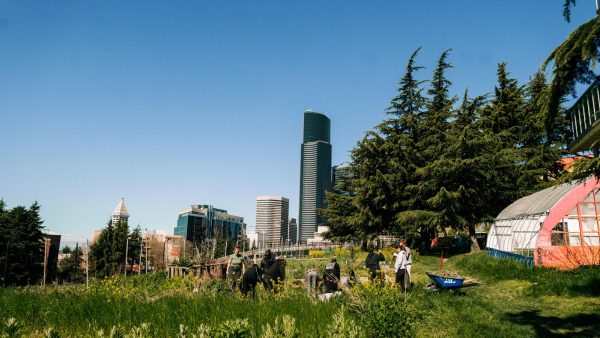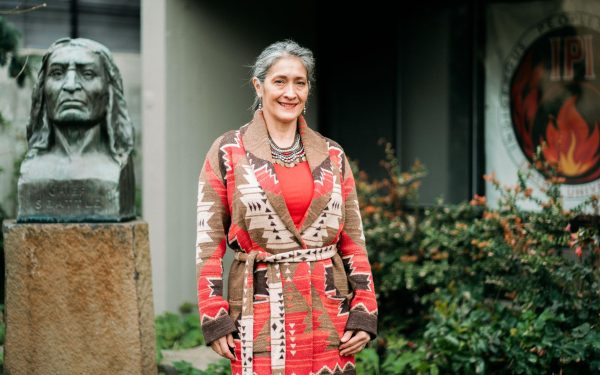Seattle U Students Shine a Light on Human Trafficking

Human trafficking often remains in the shadows, invisible to the average college student, but this past week, Seattle University students have begun illuminating the issue.
Seattle University Leadership Executive Masters in Business Administration (LEMBA) students, in collaboration with the local advocacy-oriented nonprofit, Seattle Against Slavery, hosted their first virtual training workshop on “Human Trafficking Awareness & Prevention” for undergraduate students at Seattle U.
The 90-minute training curriculum included several key parts including an introduction with basic definitions and terminology for different types of trafficking, a comparison of the local and national statistics, and a closer look into the roots and systems of human trafficking. As well as a list of resources for supportive outreach and allyship, and an open discussion between the event host and participants.
Jesse Swingle and Gail Abacan, both first-year graduate students of the LEMBA Leadership Executive MBA Program, were among the student-led team who served as lead coordinators for the event.
“Our biggest objective is to make sure that people walk away with an understanding of what human trafficking is in the university context and how they can make an impact,” Swingle said.
“Seattle is actually a pretty major hub just because of our exposure as a major shipping port,” Swingle said. “There’s a lot of people who come through here from all over the world who are being trafficked, or who even come here for other reasons, and then somehow fall into trafficking.”
According to the 2019 National Human Trafficking Hotline Statistics, 78 trafficking business were identified in the state of Washington alone. During the COVID-19 pandemic in 2020, there was a staggering 40% increase in national cases of trafficking reported.
Swingle and Abacan both emphasized that Seattle U students are not exempt from the risk of trafficking despite being a part of a campus community.
“We’re actually potentially at higher risk because it’s an expensive school,” Swindle said. “For a lot of people at more expensive universities, that Seattle U kind of falls into, there’s actually a higher incidence of students who fall into trafficking just because that debt burden is so huge.”
Tanya Fernandez, the facilitator of this training event and the Director of Education at Seattle Against Slavery, agreed that college students could face a higher risk of trafficking due to the societal pressure of paying for a college degree.
“The harder it gets to pay for college, the more vulnerable people are going to be exploited in the process,” Fernandez said. “We all are told we need higher education, to get a well paying job, to be able to survive… because the cost to live in America is going up, but our ability to afford it is staying the same, or even going down in some cases, which means that the most vulnerable communities in our country, are going to become more and more desperate. And it is, in part, desperation that leads to these situations of exploitation.”
Fernandez emphasized that students need to be cautious and vigilant. During the training, she taught students how to be good allies – how to recognize situations of sex or labor trafficking among their peers.
During the training, students were provided with scenario-based lessons on how to potentially recognize situations of sex or labor trafficking among their peers. This includes awareness of changes in personality and behavior, warning signs of unhealthy relationships, sudden changes in wealth or implicit disclosure of exploitative circumstances. In addition, the training provided guidance on safe ways to approach a friend once those behavioral changes are detected.
“Human trafficking is everywhere. It could be right under your nose, and you don’t even know it. It could be a close friend or a family member that is going through this,” Abacan said. “Especially for college kids, if you had a close friend that was going through this…wouldn’t you want to be there to help them out and support them?”
A 21-year-old survivor of sex trafficking and a fourth-year Public Affairs major, who wished to remain anonymous, spoke about how amazed they were to see human trafficking prevention event offered for the Seattle U community.
“There was this moment where it was from shock, to excitement, to, almost relief,” they said. “This is an issue that remains in the shadows, that people don’t think happens here…many students remain blissfully ignorant of the ways that trafficking impacts their community.”
The survivor stressed that if Seattle U wants to make student victims feel safe and comfortable enough to speak up and ultimately relive their trauma by reporting their experience, “the first step is caring enough to hold an event like this.”
“People act like the problem is so far away,” they said. “By just acknowledging that it’s an issue, acknowledging that it’s something that has an impact in students coming into Seattle U or students currently at Seattle U, it can create the sense of urgency surrounding the issue, which is a necessary step towards dismantling the system of trafficking and exploitation.”
Abacan, Swindle and Fernandez are hoping the university will adopt this educational training program by integrating it into the university’s core curriculum, within freshmen orientation or in specialized classes for relevant departments such as the school of business, law and nursing.
“The first goal is to do this awareness training every year. The second goal is to get this training within different majors at Seattle U, so they can integrate it maybe as extra credit,” Abacan said. “We’re trying to figure out ways that we can implement this within the curriculum at Seattle U – with orientation, and possibly, with professors’ classes that are teaching about human trafficking.”
With few changes being implemented to raise awareness on campus, the student survivor called on Seattle U to recognize its role in dismantling the system.
“There’s this impact that Seattle U has, not just with its students, and its education, but also its community,” the survivor said. “They have this beautiful ability to create safe spaces to launch preventative measures, like by adding human trafficking to their sexual assault awareness training and events. They can offer academic programs, or courses, or resources to educate the public and the university.”
If you or someone you know is in danger of human trafficking, please call the National Human Trafficking Hotline at 1-888-3737-888 or text “HELP” or “INFO” to 233733. To learn more about Human Trafficking visit https://polarisproject.org/myths-facts-and-statistics/.










